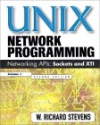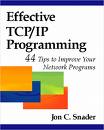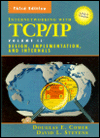Olivier Langlois's blog
Category: TCP/IP
07/06/08
UNIX Network Programming: Networking APIs: Sockets and XTI; Volume 1, Second edition
This is considered by many as the TCP/IP application programming bible and I am among them. This book is simply the most complete and detailed book on Socket programming. It describes every option under all their small details. This makes the book reading lengthy and tedious but it also makes it an excellent reference. Even experienced socket programmers will most likely learn something from this book. For myself, I got a better understanding of the listen() parameter purpose, a better understanding of socket lingering behavior and I refer the book from time to time to refresh my memory on topics such as how to time out a TCP connection attempt.
After having borrowed the second edition from someone at my work, I have decided to get myself a copy of the book. I have purchased the third edition. As of the time of writing this review the price for a used copy of the second edition is 6$ compared to 60$ for the third edition. Since I had the chance to compare the content of both editions, you might be interested to know that beside 1 bug fix in the sample code that I have noticed, the content of both edition is identical to 90% in my estimation. The changes are very minor. Some unimportant topics from the second edition such as XTI have been replaced by very specialized new topics. This means that, in my opinion, purchasing the older second edition which is still very accurate is a very good purchase.
08/13/07
Effective TCP/IP Programming: 44 Tips to Improve Your Network Programs
Not all of the 44 tips are exceptional. Some of them are pretty trivial such as "Read Stevens books" or "consult RFCs" but about 35 tips are very good. The author knows well this topic and explains very well the reasons behind these tips. I am sure that all these good tips can be found in the TCP/IP Illustrated books but if you do not have the time to read 3 volumes consisting of about 2000 pages, this less than 300 pages book will provide a nice synthesis of TCP/IP programming good practices.
06/18/07

Categories: Windows programming, Windows programming, TCP/IP, TCP/IP
Winsock 2.0
Windows sockets are not like BSD sockets. The book explains very well the different specific modes into which winsock can be used: Blocking mode in a dedicated thread, asynchronous mode using Windows messages and Overlapped I/O that removes some memory copying when passing buffer to send/receive data from/to sockets. It also covers the Socket classes provided with MFC. In my opinion, this book covers very well the details specific to Windows version of the socket API and that will allow the readers to take advantage of this socket API version.
06/15/07
Internetworking with TCP/IP volume 3
I want to set the expectations straight. This is not the best Winsock programming book. This book address higher level issues with network programming and it does a very good job at it. It is going to presents the different options for writing a server such as concurrent vs iterative or single thread vs multithread and explains carefully the tradeoff of each option. In my opinion that is the strength and the originality of the book. Another favorite part of the book is the presentation of the complete implementation of a telnet client where the author leads you through all the design and implementation process by explaining you the reasoning behind each decision.
What I did not like about the book is that like the volume 1, too many topics are covered so in many chapters the author barely touch the topic without going in depth into it and I am questioning the value of these chapters as reference.
This is the Windows version but there is also a Linux/Posix Sockets and a BSD sockets versions.
Internetworking with TCP/IP volume 2
This book goes in depth in how TCP/IP works by showing an actual working TCP/IP stack ANSI C code source. I am a believer that in order to fully understand and effectively use a piece of software, the best way to achieve this goal is to actually study at least once its source code. You will certainly get many insights in how TCP/IP works by reading this book. Unfortunately, for most readers, this will remain a theoretical exercise. I got the opportunity to work with the source code of an embedded TCP/IP stack when I was working at Nortel Networks and actually found a bug with the help of this book. That was at that moment that I truly realized the value of this volume.
:: Next Page >>
Olivier Langlois's blog
I want you to find in this blog informations about C++ programming that I had a hard time to find in the first place on the web.
| Next >
| Sun | Mon | Tue | Wed | Thu | Fri | Sat |
|---|---|---|---|---|---|---|
| << < | > >> | |||||
| 1 | 2 | 3 | 4 | 5 | 6 | 7 |
| 8 | 9 | 10 | 11 | 12 | 13 | 14 |
| 15 | 16 | 17 | 18 | 19 | 20 | 21 |
| 22 | 23 | 24 | 25 | 26 | 27 | 28 |
| 29 | 30 | 31 | ||||
Search

Categories
Olivier Langlois's blog
- AAC (2)
- Book reviews (12)
- C++ (24)
- Code Optimization (4)
- Compiler (3)
- Fractal (2)
- Linux/UNIX (3)
- Multithreading (3)
- Software security (7)
- TCP/IP (8)
- Web (1)
- Windows programming (19)
- C++ (28)
- tutorials (4)
- General (10)
- Hardware reviews (2)
- Linux (12)
- Recommended books (4)
- C++ (20)
- Code Optimization (2)
- Compiler (3)
- Fractal (2)
- Linux/UNIX (1)
- Multithreading (2)
- Rare out of print (3)
- Software security (5)
- TCP/IP (7)
- Windows programming (16)
- Software reviews (0)
- TCP/IP (8)
- Video games (4)
Archives
- January 2016 (1)
- September 2015 (1)
- July 2015 (1)
- June 2015 (1)
- May 2015 (1)
- December 2013 (3)
- September 2013 (1)
- May 2013 (8)
- April 2013 (1)
- December 2010 (1)
- August 2010 (1)
- June 2010 (1)
- More...
Misc
 XML Feeds
XML Feeds
What is RSS?
Who's Online?
- Guest Users: 1
 BOOKS i'm reading
BOOKS i'm reading







